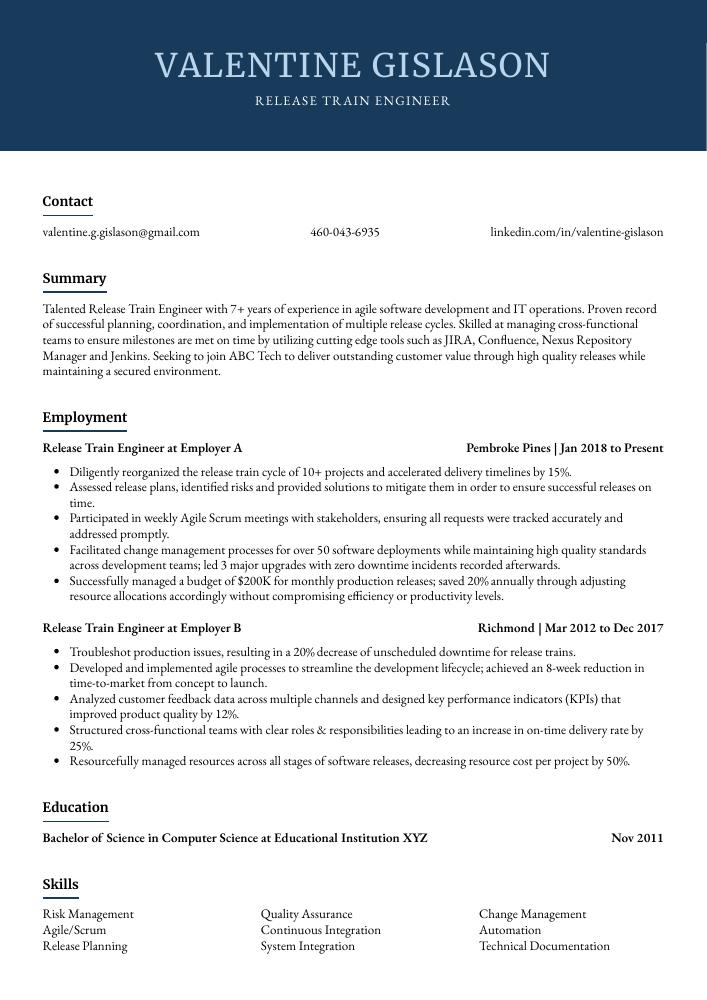Release Train Engineer Resume Guide
Release train engineers manage the development, testing and release of software products. They coordinate with cross-functional teams to ensure that projects are completed on time and within budget. They also create plans for product releases, as well as track progress against those plans.
You have the experience and expertise to be a great release train engineer, but potential employers don’t know about you yet. To make them aware of your skillset and background, it’s important that you write an attention-grabbing resume.
This guide will walk you through the entire process of creating a top-notch resume. We first show you a complete example and then break down what each resume section should look like.
Table of Contents
The guide is divided into sections for your convenience. You can read it from beginning to end or use the table of contents below to jump to a specific part.
Release Train Engineer Resume Sample
Valentine Gislason
Release Train Engineer
[email protected]
460-043-6935
linkedin.com/in/valentine-gislason
Summary
Talented Release Train Engineer with 7+ years of experience in agile software development and IT operations. Proven record of successful planning, coordination, and implementation of multiple release cycles. Skilled at managing cross-functional teams to ensure milestones are met on time by utilizing cutting edge tools such as JIRA, Confluence, Nexus Repository Manager and Jenkins. Seeking to join ABC Tech to deliver outstanding customer value through high quality releases while maintaining a secured environment.
Experience
Release Train Engineer, Employer A
Pembroke Pines, Jan 2018 – Present
- Diligently reorganized the release train cycle of 10+ projects and accelerated delivery timelines by 15%.
- Assessed release plans, identified risks and provided solutions to mitigate them in order to ensure successful releases on time.
- Participated in weekly Agile Scrum meetings with stakeholders, ensuring all requests were tracked accurately and addressed promptly.
- Facilitated change management processes for over 50 software deployments while maintaining high quality standards across development teams; led 3 major upgrades with zero downtime incidents recorded afterwards.
- Successfully managed a budget of $200K for monthly production releases; saved 20% annually through adjusting resource allocations accordingly without compromising efficiency or productivity levels.
Release Train Engineer, Employer B
Richmond, Mar 2012 – Dec 2017
- Troubleshot production issues, resulting in a 20% decrease of unscheduled downtime for release trains.
- Developed and implemented agile processes to streamline the development lifecycle; achieved an 8-week reduction in time-to-market from concept to launch.
- Analyzed customer feedback data across multiple channels and designed key performance indicators (KPIs) that improved product quality by 12%.
- Structured cross-functional teams with clear roles & responsibilities leading to an increase in on-time delivery rate by 25%.
- Resourcefully managed resources across all stages of software releases, decreasing resource cost per project by 50%.
Skills
- Risk Management
- Quality Assurance
- Change Management
- Agile/Scrum
- Continuous Integration
- Automation
- Release Planning
- System Integration
- Technical Documentation
Education
Bachelor of Science in Computer Science
Educational Institution XYZ
Nov 2011
Certifications
SAFe Release Train Engineer (RTE)
Scaled Agile
May 2017
1. Summary / Objective
Your resume summary or objective should be an elevator pitch that gives the hiring manager a snapshot of your experience and qualifications as a release train engineer. Include details such as how many years you have been in this role, any certifications or awards you may have received, and the number of successful software releases under your belt. You can also mention any innovative approaches to automation or process improvement that you implemented at previous companies.
Below are some resume summary examples:
Determined Release Train Engineer with 5+ years of experience in leading complex initiatives from concept to launch. Skilled at managing cross-functional teams and developing strategies for successful product releases. At XYZ, successfully coordinated the release process for 10 products over a 6-month period using Agile methodology. Experienced in working with stakeholders across multiple departments to ensure timely delivery of projects on schedule and within budget constraints.
Professional release train engineer with 5+ years of experience in the software development and delivery process. Skilled at setting up, planning, managing and executing release trains for large-scale enterprise applications. Experienced in working on CI/CD pipeline automation processes to ensure smooth product releases while minimizing downtime. Proven record of improving product quality through best practices such as code reviews and automated testing protocols.
Reliable release train engineer with 8+ years of experience in agile project management and software development. Skilled at coordinating cross-functional teams, leading sprint planning sessions, and ensuring successful product deliveries. At XYZ Corp., implemented a streamlined release process that improved cycle time by 20%, reducing costs by 15%. Looking to bring this expertise to ABC’s DevOps team for greater operational efficiency.
Detail-oriented Release Train Engineer with 5+ years of experience in leading cross-functional teams. Experienced championing agile principles and developing best practices to ensure the successful delivery of software products. At XYZ, led 6 scrum teams through 4 major product releases while reducing cycle time by 30%. Consistently recognized as a reliable leader who strives for excellence during the entire software release process.
Proficient Release Train Engineer with 5+ years of experience leading Agile and Scrum teams in the delivery of high-quality software solutions. Experienced in developing strategies for continuous improvement, coordinating cross-functional workflows, monitoring release progress, and managing releases on time. Seeking to join ABC Team as a Release Train Engineer to ensure successful product launches that exceed customer expectations.
Accomplished release train engineer with 8+ years of experience in software delivery and agile methodologies. Led the successful implementation of DevOps practices throughout ABC Company’s product pipeline, resulting in a 50% decrease in development time from concept to launch. Highly competent at managing multiple projects simultaneously while maintaining high standards for quality assurance and customer satisfaction.
Passionate release train engineer with 8+ years of experience leading Agile teams to deploy and maintain software releases. Proven track record of ensuring best practices are followed, driving projects from conception to completion, and managing risk-mitigation strategies across multiple branches. Seeking a position at ABC Tech where I can leverage my expertise for successful product launches.
Seasoned Release Train Engineer with 8+ years of experience in the software industry. Expertise in developing and executing release processes, coordinating between agile teams, and leading scrum ceremonies that ensure on-time delivery. Committed to delivering high quality products while optimizing cost savings at ABC Tech through improved CI/CD pipeline automation.
2. Experience / Employment
In the experience/employment/work history section, you should list your roles in reverse chronological order. Stick to bullet points, as this makes it easier for the reader to digest what you have written quickly and efficiently.
When writing about each role, make sure that you provide detail on what exactly was involved and any quantifiable results achieved. For example, instead of saying “Coordinated releases,” you could say something like “Managed release train coordination process across 10+ teams; reduced time-to-market by 25% through improved collaboration between stakeholders.”
To write effective bullet points, begin with a strong verb or adverb. Industry specific verbs to use are:
- Coordinated
- Scheduled
- Monitored
- Automated
- Streamlined
- Assessed
- Analyzed
- Optimized
- Documented
- Implemented
- Tested
- Troubleshot
- Resolved
- Managed
- Tracked
Other general verbs you can use are:
- Achieved
- Advised
- Compiled
- Demonstrated
- Developed
- Expedited
- Facilitated
- Formulated
- Improved
- Introduced
- Mentored
- Participated
- Prepared
- Presented
- Reduced
- Reorganized
- Represented
- Revised
- Spearheaded
- Structured
- Utilized
Below are some example bullet points:
- Introduced and implemented DevOps principles and practices across 8 Agile teams, resulting in a 25% increase in product delivery velocity.
- Managed the coordination of over 150 software releases per quarter; reduced downtime incidents by 60%.
- Proficiently developed strategies to manage risks associated with release processes throughout the entire SDLC cycle.
- Spearheaded initiatives to improve team collaboration between various departments such as QA, Development and IT operations; increased efficiency by 40%.
- Prepared detailed reports on release progress that included metrics such as throughputs and lead times for senior management review, enabling better decision-making regarding future product launches/updates.
- Resolved over 500 issues related to cross-functional software releases, reducing the time taken for release cycles by 10%.
- Advised stakeholders on best practices and strategies to optimize system performance; improved customer satisfaction ratings by 6%.
- Thoroughly tested new systems prior to deployment, ensuring that all functionality was up-to-date and met quality standards.
- Tested over 400 modules using automated testing tools such as Selenium WebDriver; identified & documented 50+ bugs in QA sprints before they reached production environments.
- Implemented a streamlined process for tracking changes across multiple teams during release cycles, resulting in an increase of 20% efficiency rate per month compared with previous methods used.
- Formulated and implemented Agile development processes to improve the release train engineering process; increased productivity by 35%.
- Coordinated and managed up to 8 concurrent agile releases, leading a team of 10 engineers in each project; reduced product delivery time by 30% with successful on-time deployments for all projects.
- Mentored junior software engineers in Agile methodology principles and practices, providing guidance during every step of the development cycle from planning through implementation phase.
- Independently identified areas for improvement within multiple teams’ workflow strategies that led to an improved overall quality assurance rate of 80%.
- Utilized JIRA, Confluence and other Atlassian toolsets with proficiency; actively participated in sprint reviews & retrospectives resulting in faster resolution times when managing impediments or issues encountered throughout the process flow.
- Represented multiple teams in their Agile Release Train (ART) by attending daily stand-up meetings, coordinating release activities and interfacing with stakeholders; successfully managed 3 ARTs concurrently.
- Revised the overall software development process to include continuous integration & delivery practices, resulting in a 22% reduction of production errors across all applications.
- Meticulously tracked changes on multiple project backlogs using JIRA and ensuring that stakeholders were informed of any updates throughout each sprint cycle; reduced average time for resolution from 6 days to 4 days per issue reported.
- Improved productivity within the engineering team through regular retrospectives, thereby increasing velocity by 25% during successive sprint cycles over a period of 8 months.
- Documented processes related to product releases and deployments while keeping up-to-date records of feedback received from customer surveys according to company standards; improved customer satisfaction rating from 75% to 85%.
- Reduced release cycles by 20% through implementation of process automation and efficient use of resources.
- Demonstrated strong communication skills when coordinating with stakeholders, vendors and IT teams to ensure successful delivery of releases on time.
- Substantially improved release quality for over 150 products; identified & fixed software bugs before deployment, resulting in a 50% reduction in post-release customer complaints.
- Streamlined product development lifecycle management processes across 10+ agile development teams using Jira/Confluence toolsets; achieved faster turnaround times and better efficiency gains companywide.
- Presented monthly release progress reports to the executive team outlining overall successes, areas needing improvement, potential risks etc., helping prioritize projects accordingly.
- Optimized the delivery of software releases by implementing a comprehensive release train process that reduced cycle times by 30%.
- Expedited the deployment and distribution of updates to over 500 users worldwide, increasing customer satisfaction ratings by 20%.
- Actively monitored the development environment while managing multiple scrum teams; identified and resolved conflicts before they impacted production deadlines.
- Achieved 5+ successful release cycles without any service disruptions or performance issues in a large-scale enterprise system with 18 million lines of codebase.
- Automated key processes within the release engineering pipeline using popular DevOps tools such as Jenkins, Ansible and Kubernetes; improved efficiency by 50% compared to manual approaches.
- Tracked and monitored the progress of over 30 software releases per quarter, ensuring that all release train objectives were met within established timelines and budget.
- Scheduled and executed weekly scrum meetings with 10+ team members to review project statuses, identify areas of improvement, adjust strategies accordingly and ensure smooth product delivery at all times.
- Consistently produced detailed reports on release cycle activities covering tracking/monitoring metrics such as timeline adherence (95%), cost effectiveness ($45K saved) and quality control (+10%) results.
- Compiled comprehensive documentation for each software version released; successfully reduced manual errors in deployment processes by 25%.
- Regularly communicated project updates to stakeholders including senior management team & technical staff; facilitated successful communication between cross-functional teams leading up to launch date by 20%.
3. Skills
The skillset employers require in an employee will likely vary, either slightly or significantly; skimming through their job adverts is the best way to determine what each is looking for. One organization may require the candidate to be proficient in Agile methodology, while another might need experience with DevOps.
It is essential to tailor your skills section of your resume for each job you are applying for because a lot of employers use applicant tracking systems these days; they scan resumes for certain keywords before passing them on to a human.
You should also make sure that you elaborate on the most important ones in other sections such as the summary or experience section. This will give recruiters more insight into what makes you an ideal fit and increase your chances of landing an interview!
Below is a list of common skills & terms:
- Agile/Scrum
- Automation
- Change Management
- Continuous Integration
- Quality Assurance
- Release Planning
- Risk Management
- System Integration
- Technical Documentation
4. Education
Including an education section on your resume will depend on how far along you are in your career. If you just graduated and have no work experience, mention your education below your resume objective. However, if you have significant work experience to showcase, it is not necessary to include an education section.
If the decision is made to include an education section, make sure that any courses or subjects mentioned are relevant to the release train engineer role being applied for.
Bachelor of Science in Computer Science
Educational Institution XYZ
Nov 2011
5. Certifications
Certifications are a great way to demonstrate your expertise and knowledge in a certain field. They can be used to show potential employers that you have the qualifications necessary for the job, as well as any additional skills or training you may have acquired.
Including certifications on your resume is an excellent way of highlighting relevant experience and abilities which could give you an edge over other applicants. Be sure to include any industry-specific certification programs that are applicable to the position you are applying for, such as IT certifications or medical credentials.
SAFe Release Train Engineer (RTE)
Scaled Agile
May 2017
6. Contact Info
Your name should be the first thing a reader sees when viewing your resume, so ensure its positioning is prominent. Your phone number should be written in the most commonly used format in your country/city/state, and your email address should be professional.
You can also choose to include a link to your LinkedIn profile, personal website, or other online platforms relevant to your industry.
Finally, name your resume file appropriately to help hiring managers; for Valentine Gislason, this would be Valentine-Gislason-resume.pdf or Valentine-Gislason-resume.docx.
7. Cover Letter
Attaching a cover letter to your job application is a great way to introduce yourself and provide more information than what’s included in your resume. It typically consists of 2 to 4 paragraphs that explain why you’re the perfect fit for the role.
Cover letters are not always required, however they can be an effective tool when applying for jobs. They allow employers to gain better insights into who you are as a professional and highlight any skills or experiences that may set you apart from other candidates.
Below is an example cover letter:
Dear Arjun,
I am writing to apply for the Release Train Engineer position at XYZ Corporation. I am a certified scrum master with four years of experience in Agile software development environments. In my current role, I manage and coordinate all aspects of the release process for multiple software products. I am confident that I can bring my knowledge and expertise to XYZ Corporation and contribute to the success of your organization.
Some key accomplishments from my previous roles include:
– Streamlining the release process by implementing new tools and processes that reduced cycle time by 30%
– Leading a team of 10+ developers in an Agile environment and successfully delivering multiple releases on schedule
– Managing risk and dependencies across multiple projects to ensure smooth delivery of final product
My experience has given me a deep understanding of what it takes to manage a successful release train. I am excited about the opportunity to use my skills and knowledge to help XYZ Corporation achieve its goals. If you have any questions, please do not hesitate to contact me at [phone number] or [email address]. Thank you for your time and consideration.
Sincerely,
Valentine
Release Train Engineer Resume Templates
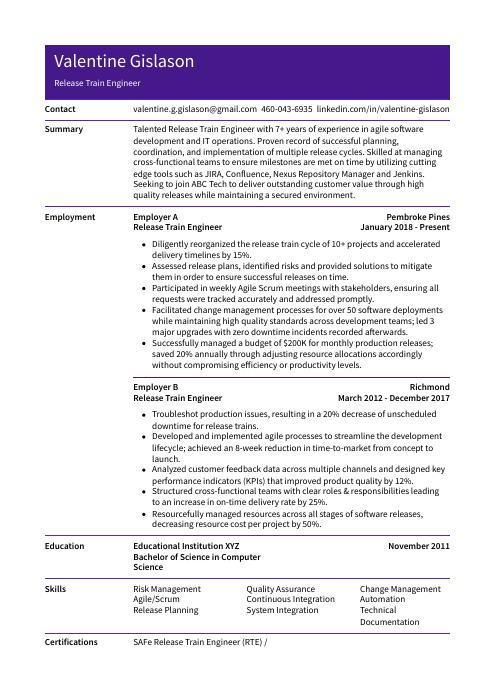 Pika
Pika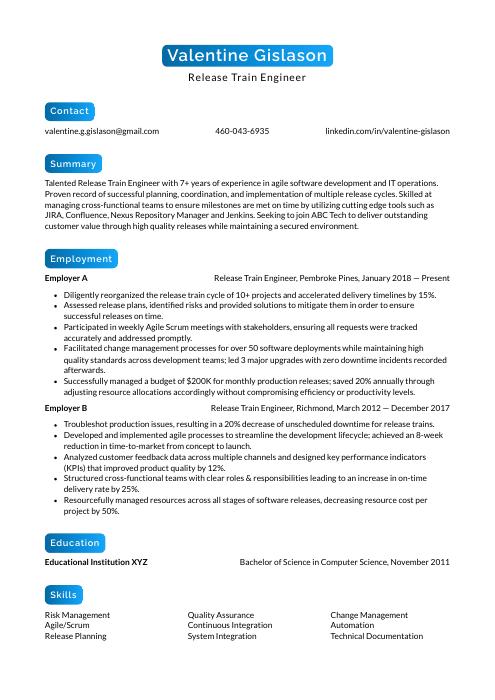 Kinkajou
Kinkajou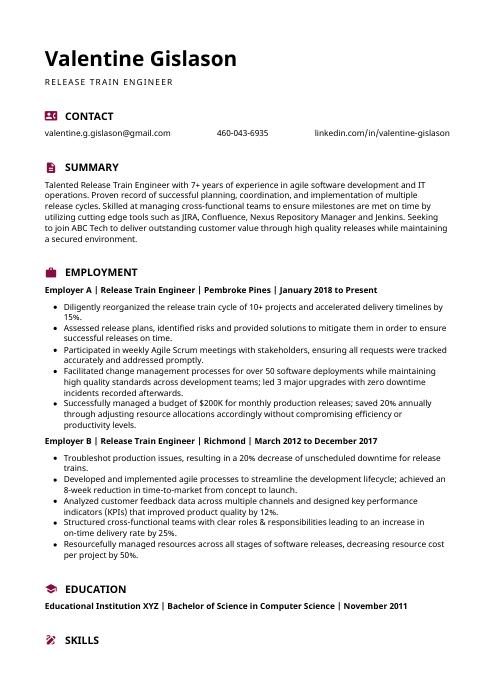 Hoopoe
Hoopoe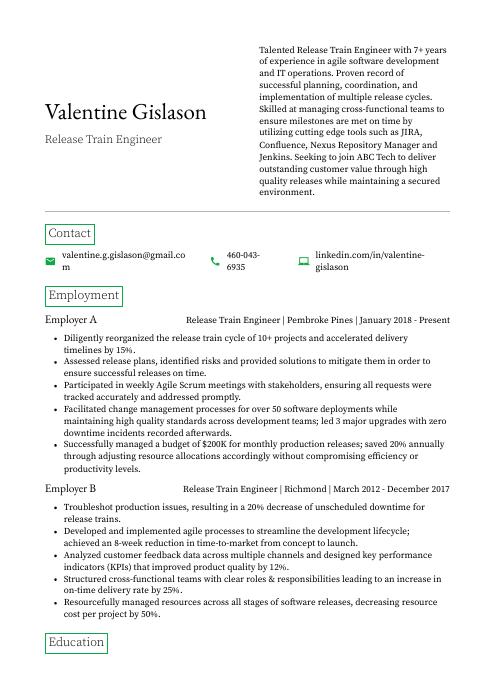 Quokka
Quokka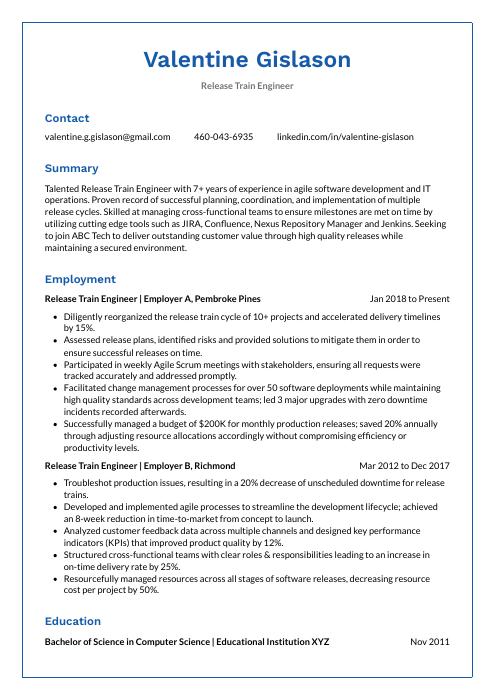 Markhor
Markhor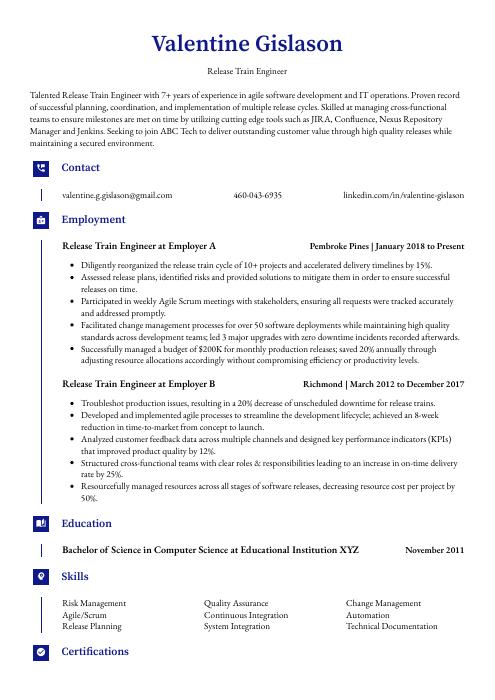 Gharial
Gharial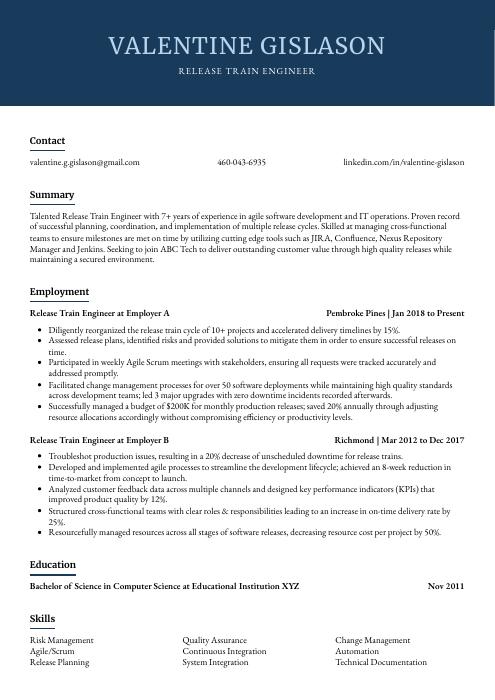 Bonobo
Bonobo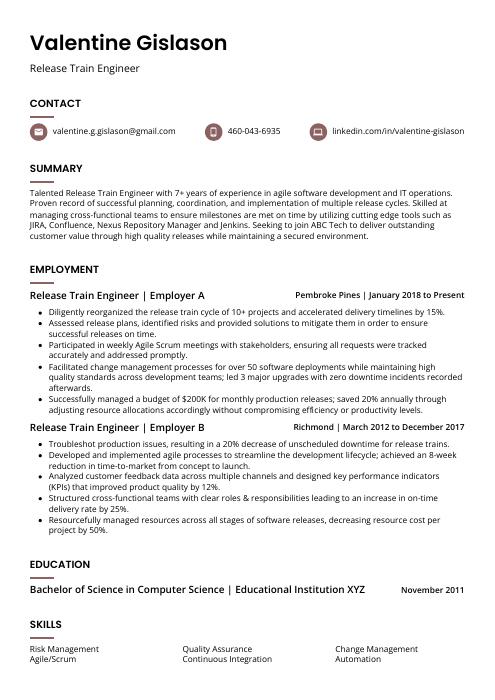 Fossa
Fossa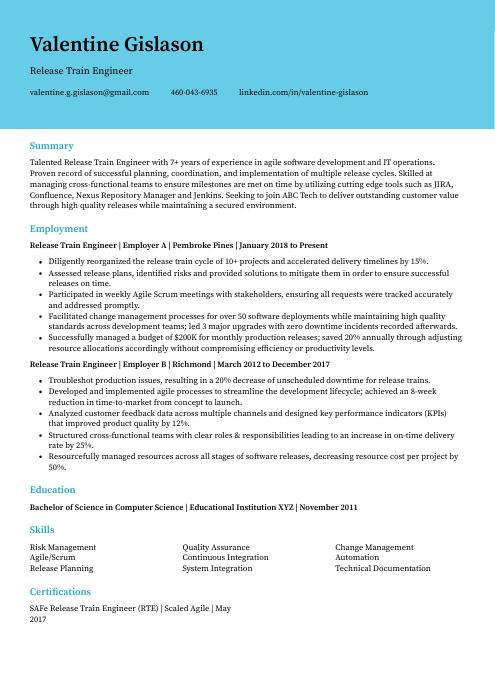 Dugong
Dugong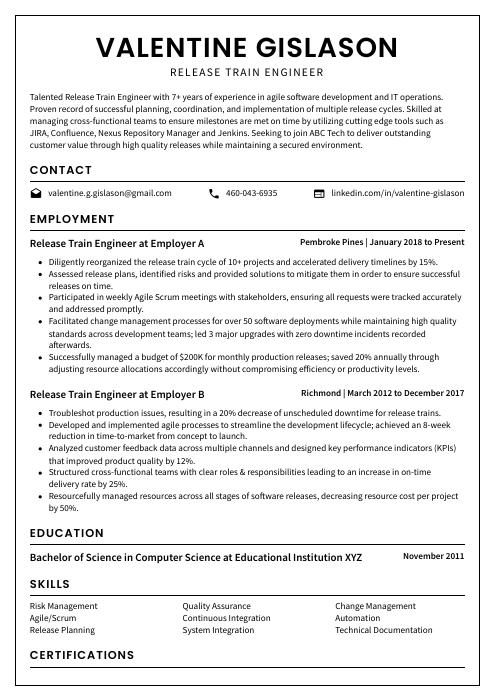 Cormorant
Cormorant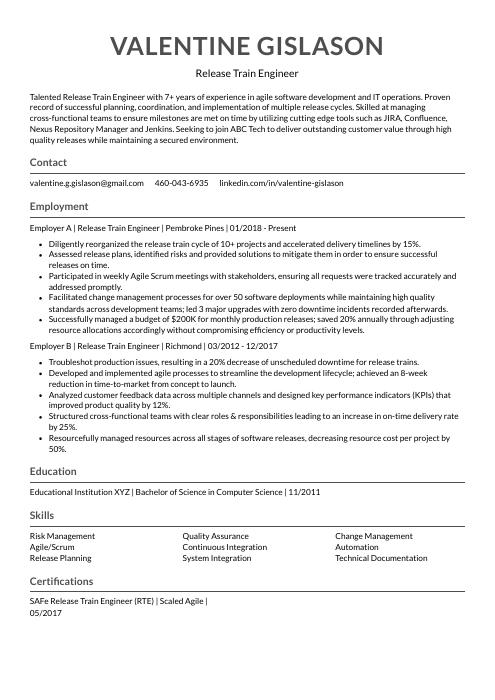 Indri
Indri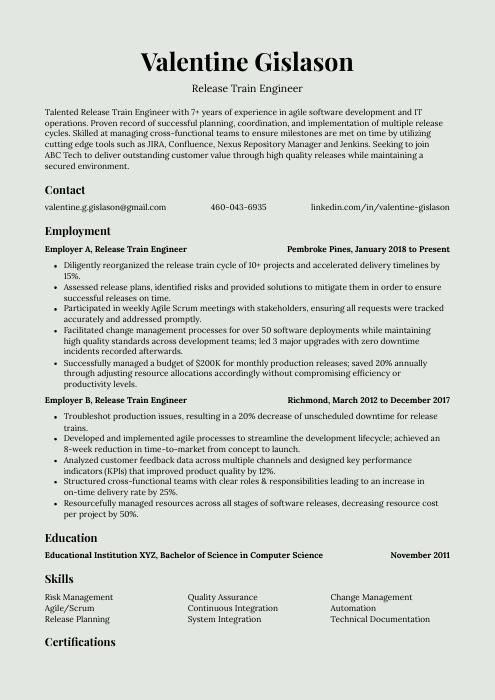 Saola
Saola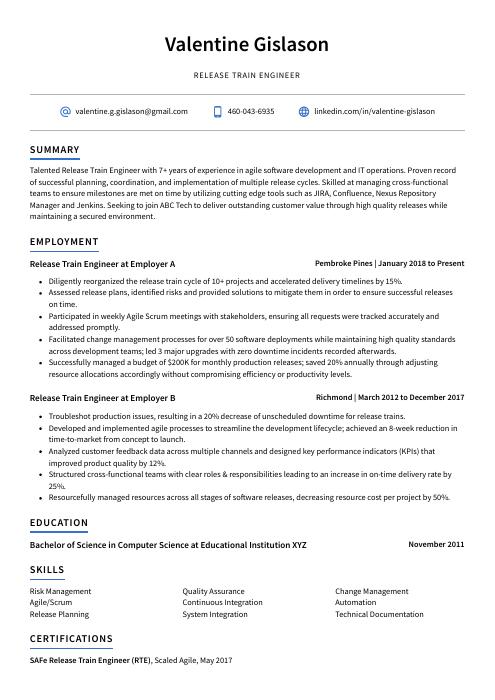 Axolotl
Axolotl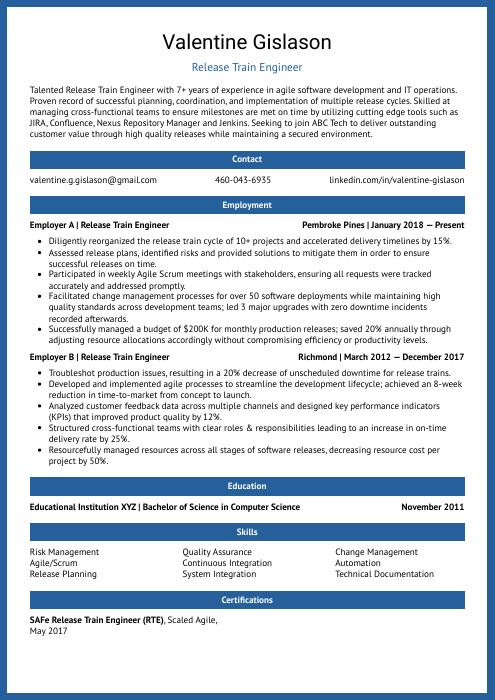 Ocelot
Ocelot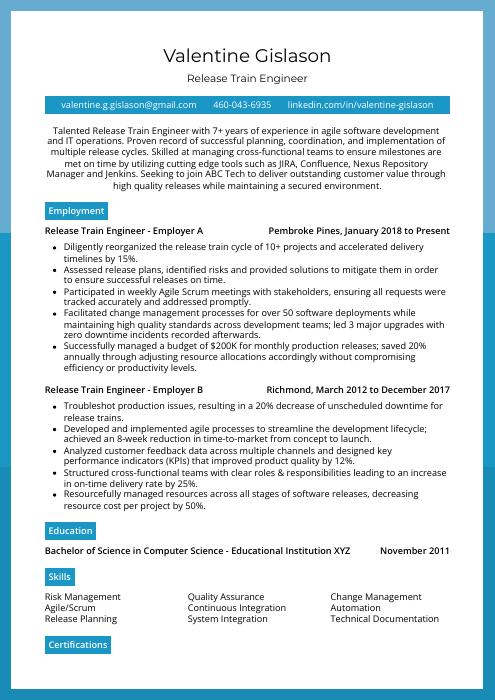 Rhea
Rhea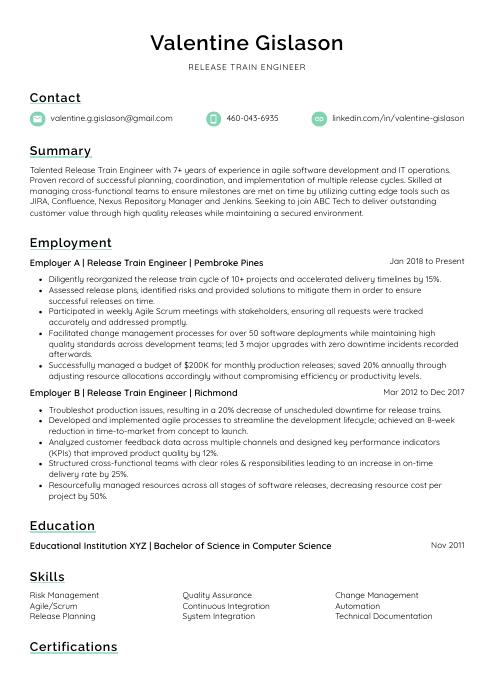 Lorikeet
Lorikeet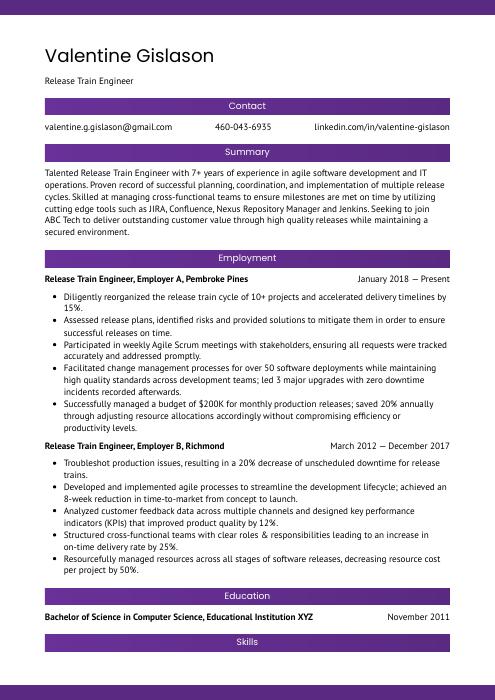 Jerboa
Jerboa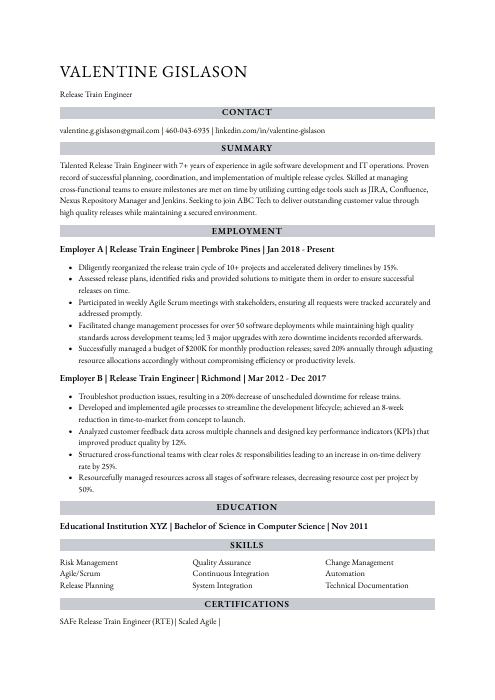 Numbat
Numbat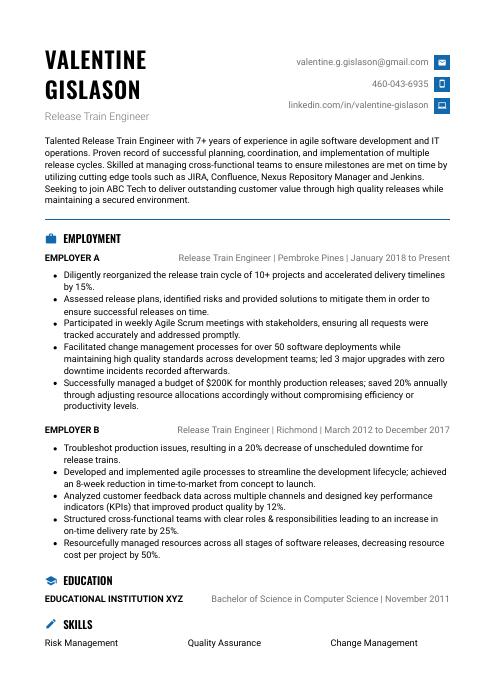 Echidna
Echidna Rezjumei
Rezjumei
